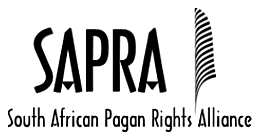CAPE TOWN, South Africa – Witches in the U.S. may be aware that South Africa still retains colonial British-inspired legislation prohibiting the knowledge and practice of Witchcraft. The Witchcraft Suppression Act (3 of 1957) has been under legal review since 2010, at the insistence of South African Witches.
In February 2007 I requested the South African Law Reform Commission, on behalf of the South African Pagan Rights Alliance (SAPRA), to investigate whether Act 3 was consistent with section 15 of the South African Constitution which guarantees the right to freedom of conscience, religion, thought, belief and opinion.

In January 2016 the Commission concluded that the Witchcraft Suppression Act’s prohibition against identifying as a Witch and professing knowledge of Witchcraft was inconsistent with section 15 and therefore unconstitutional.
A protracted period of calls for public comment from individuals, secular and religious organisations, including innumerable delays in processing submissions and finalizing reports, has finally yielded a ‘Revised Discussion Paper 158, Project 135: The Review of the Witchcraft Suppression Act 3 of 1957’, which may be accessed by the public.
Whilst it is apparent that the Commission does support the repeal of Act 3, it has been requested to consider the drafting of a Prohibition of Harmful Witchcraft Practices Bill to replace the Witchcraft Suppression Act. The Bill defines “harmful witchcraft practice” as:
“…invoking a claim to the ability to use non-natural or supernatural means, whether that involves the use of physical elements or not, to threaten or to cause:
(i) death or injury or disease or disability to any person; or
(ii) destruction or loss or damage to property of any kind; or
(iii) severe psychological distress or terror ”
[Prohibition of Harmful Witchcraft Practices Bill page xxviii]
In preparation for its own submission in a comment to the revised paper, SAPRA will be challenging the Commission’s failure to meet any established legal burden of proof standard in motivating its proposal to draft new legislation to regulate what the Commission identifies as “harmful witchcraft practices”. By claiming, as it does, that “there is overwhelming evidence of harmful witchcraft practices” requiring regulation and prohibition, the Commission relies only on a submitted anecdotal allegation without providing any evidence for the allegation.
The Commission unwittingly proposes, at the insistence of written submission, that our courts should begin to consider hearing circumstantial allegations of threats of supernatural harm committed by practitioners of witchcraft, by claimants who believe that their own misfortunes are caused by unprovable supernatural means. The Commission is also inviting, according to the Bill, essentially fraudulent claims of harm; the Bill requires complainants to prove unprovable allegations with evidence, or face prosecution themselves. Makers of supernatural claims, therefore, have an inescapable and impossible burden of proof.

Women being hanged for witchcraft, Newcastle, 1655. “A. Hangman, B. Bellman. C. Two sergeants. D. Witch-finder taking his money for his work.” [public domain]
The Bill also erroneously seeks to include a prohibition against the crime of human mutilation for the purpose of folk magic. South African case law indicates clearly that no person ever charged with soliciting or perpetrating the crime of human mutilation for the purpose of “muti” (meaning, medicine), a crime referred to as “muti murders”, has ever indicated that they identify as Witches or that they are practitioners of Witchcraft. Self-identifying Witches practicing Witchcraft do not perpetrate the crime under review. Human mutilations do not constitute a ritual or religious Witchcraft practice. Since the perpetrators of muti murders do not identify as Witches, the SALRC’s proposal to associate muti murders with Witchcraft amounts to erroneous prejudicial stereotyping against Witches.
SAPRA will move that “muti murders” are already prohibited in terms of common law in the instance of murder. In addition, the organization notes that the National Health Act already regulates the control and use of human tissue. Therefore, there is no need to further regulate this crime, nor is there a justifiable reason to categorize this crime as a “harmful witchcraft practice”.
The proposed Prohibition of Harmful Witchcraft Practices Bill amounts to indirect bias against Witches and will result in direct prejudice against Witches and Witchcraft if the Commission recommends that it be adopted by Parliament. African lawmakers may still incline toward believing that witchcraft remains a dangerous and nefarious practice.
To address the issue of accusations of witchcraft which inevitably lead to violent witch-hunts, SAPRA will draw the Commission’s attention to the United Nations Human Rights Council’s draft resolution 47, article 6, which reads “States should carefully distinguish between harmful practices amounting to human rights violations related to accusations of witchcraft and ritual attacks, and the lawful and legitimate exercise of different kinds of religion or beliefs, in order to preserve the right to freely manifest a religion or a belief, individually or in a community with others, including for persons belonging to religious minorities”.
Currently, the Witchcraft Suppression Act legally entrenches automatic bias against Witches, especially in disputes regarding employment, divorce, and child custody, and automatically prejudices our right to freedom of expression in the public sphere. Witches have a right to be treated with equal dignity, and to enjoy the full and equal enjoyment of all rights and freedoms guaranteed to other citizens.
The closing date for comment on the Revised Discussion Paper is 31 October 2022.
If you wish to engage in a discussion with SAPRA before submitting a comment, contact the Director of Legal Services at info@paganrightsalliance.org.
The Wild Hunt is not responsible for links to external content.
To join a conversation on this post:
Visit our The Wild Hunt subreddit! Point your favorite browser to https://www.reddit.com/r/The_Wild_Hunt_News/, then click “JOIN”. Make sure to click the bell, too, to be notified of new articles posted to our subreddit.